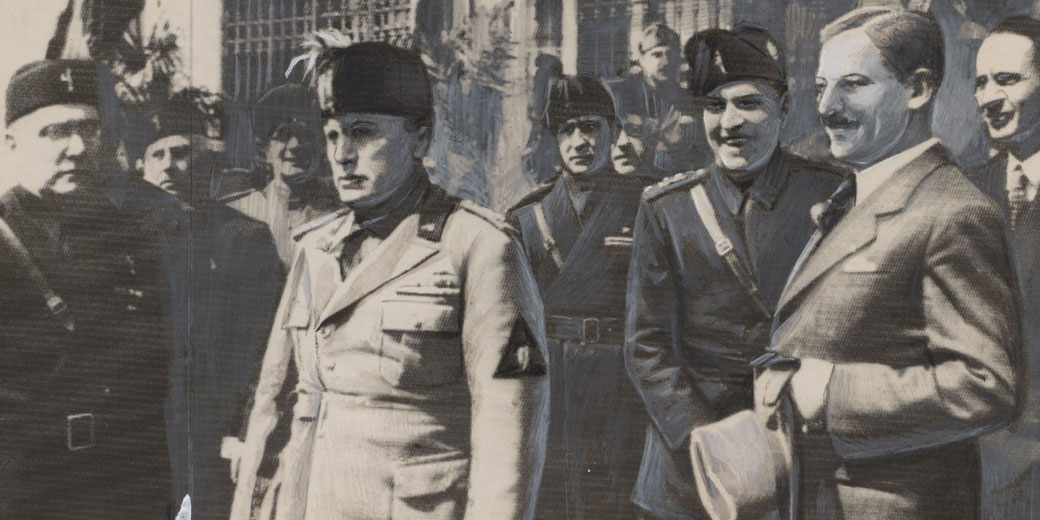Why did Mussolini invade Ethiopia?

The invasion of Ethiopia by Italy in 1935 is one of the most shocking events in the lead up to World War II. It not only highlighted the aggressive expansionist policies of Benito Mussolini's Fascist regime but also exposed the underlying weaknesses of the League of Nations.
But what drove Mussolini to invade this ancient African kingdom?
And how did this contribute to the outbreak of WWII?
What was the Second Italo-Ethiopian War?
The Italian-Ethiopian War broke out between 1935 and 1936. It was a conflict initiated by Fascist Italy's invasion of Ethiopia: one of the last independent nations in Africa.
Driven by Benito Mussolini's larger imperial ambitions, it followed from Italy's previous defeat at the Battle of Adwa in 1896.
This was a catastrophic failure for Italy, where Ethiopian forces had humiliated Italian invaders in a decisive defeat.
So, this new invasion was designed to be much more in Italy's favor. Mussolini had invested in more modem technologies, including chemical weapons.
Who was Benito Mussolini?
Benito Mussolini (1883-1945) was an Italian political leader who became the founder of Italian Fascism and the country's prime minister from 1922 to 1943.
Born in Predappio, Italy, Mussolini initially aligned himself with socialist ideologies, but his views shifted dramatically after World War I.
By 1919, he had founded the Fascist Party, which promoted nationalism and militarism.
then, Mussolini's rise to power began in 1922 when he and his Blackshirt followers marched on Rome.
This led King Victor Emmanuel III to invite him to form a government. Once in power, Mussolini gradually dismantled Italy's democratic institutions, establishing a one-party rule and positioning himself as "Il Duce" (The Leader).
Under his leadership, Italy pursued more aggressive expansionist policies. This ultimately led to the invasion of Ethiopia and an alliance with Nazi Germany.
Reason 1: The quest for a new Roman Empire
Mussolini's vision for Italy was to restore it to the greatness of the ancient Roman Empire.
He believed that in order to achieve this, Italy needed to expand its territories and establish a vast colonial empire.
Ethiopia, one of the few independent nations in Africa at the time, was a prime target.
By conquering Ethiopia, Mussolini hoped to link Italy's existing colonies in East Africa – Eritrea and Somalia – and create a contiguous Italian East African empire.
Reason 2: Revenge for the Battle of Adwa
In 1896, Italy suffered a humiliating defeat at the hands of Ethiopian forces at the Battle of Adwa.
This was a significant blow to Italy's national pride, as it was one of the few instances where an African army defeated a European colonial power.
For Mussolini, the invasion of Ethiopia was an opportunity to avenge this defeat and erase the memory of Adwa from Italy's national consciousness.
Reason 3: Economic motivations
The Great Depression of the 1930s hit Italy very hard. Mussolini believed that by acquiring new territories, Italy could gain access to raw materials and new markets for its goods.
Therefore, Ethiopia, with its vast resources, offered a potential solution to Italy's economic woes.
Reason 4: The weakness of the League of Nations
The League of Nations, established after World War I to maintain global peace, had so far proven ineffective in stopping aggressive actions by its member states.
Mussolini recognized this weakness and believed that the League would not intervene if Italy invaded Ethiopia.
Actually, his assumptions were largely correct; while the League did impose sanctions on Italy, they were not comprehensive and did little to deter the invasion.
Reason 5: Domestic politics
Mussolini's regime was authoritarian and relied on propaganda to maintain its grip on power.
A successful invasion of Ethiopia would not only boost Mussolini's image as a strong leader but also divert attention from domestic issues.
Consequently, the war provided a rallying point for the Italian people and solidified support for the Fascist regime.
Ultimately, however, while Mussolini achieved his immediate goal of annexing Ethiopia, the invasion set Italy on a collision course with other major powers and played a role in the events leading up to World War II.
The international community's failure to effectively respond to Italy's aggression highlighted the limitations of the League of Nations.
As a result, underscored the need for a more robust international system to maintain peace.
What do you need help with?
Download ready-to-use digital learning resources
Copyright © History Skills 2014-2025.
Contact via email
With the exception of links to external sites, some historical sources and extracts from specific publications, all content on this website is copyrighted by History Skills. This content may not be copied, republished or redistributed without written permission from the website creator. Please use the Contact page to obtain relevant permission.





